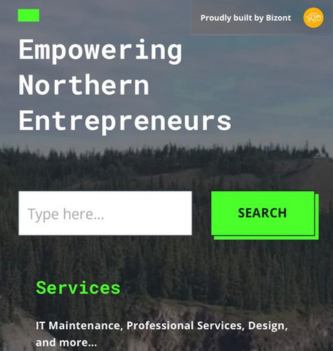

For businesses in the Yukon, the Yukon Government (YG) has the potential to be their largest customer — most often by deal volume through direct awards, and sometimes by deal size, most common through open tenders. Local companies benefit most when they can clearly see and understand where government spending is going.
That’s where Yukon Connect comes in. Built by Bizont, Yukon Connect is more than a database — it’s a business intelligence platform for Yukon procurement. It brings together publicly available data on tenders that have been awarded into one searchable hub.
Whether you sell services, goods, or products, this tool makes it easier to:
Head to yukonconnecthub.ca. Use the search bar and filters to quickly sort awarded tenders by fiscal year, department, contract type, vendor, date range, or dollar value.
💡 Example: Type in “graphic design” and then open the Filter tab. You can narrow results to a specific department (e.g., Education), a vendor you want to track, or contracts awarded in a particular fiscal year. In seconds, you’ll see which companies have recently secured graphic design work with YG, for how much, and through which department.
Here’s how three types of Yukon businesses can use Yukon Connect as a business intelligence platform:
Services
(e.g., marketing, consulting, tourism, hospitality, janitorial, catering, training, IT support, professional services like legal or HR)
Goods
(e.g., construction materials, safety equipment, office supplies, medical supplies)
Products & Retail
(e.g., uniforms, fuel, electronics, vehicles and parts)
Because Yukon Connect focuses on tenders that have been awarded, it isn’t about chasing live opportunities. Instead, it’s about turning award data into business intelligence:
💡 Examples:
Beyond tracking awarded tenders, Yukon Connect can support smarter business decisions by helping you:
All of the information in Yukon Connect is already public. What we’ve done is make that data easier to access, filter, and visualize.
Yukon Connect gives local businesses the insights they need to plan ahead, diversify, and strengthen their competitive position.
Our goal is to help Yukon businesses level the playing field against larger Outside firms, while giving every company working in the territory the transparency needed to compete fairly.
We’d love to hear how you’re using Yukon Connect and what features would make it more useful for your business. Your feedback will help us continue improving the tool and ensuring it delivers real value to the local business community.
👉 Start exploring awarded tenders today at yukonconnecthub.ca
Contact us [email protected]
If something in this post resonated—or sparked ideas—we’d love to hear from you.
If something in this post resonated—or sparked ideas—we’d love to hear from you.

Join our mailing list to receive fresh insights, stories and updates.